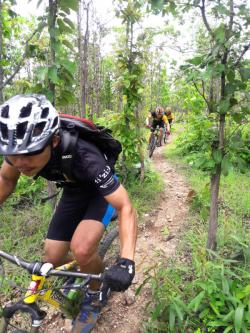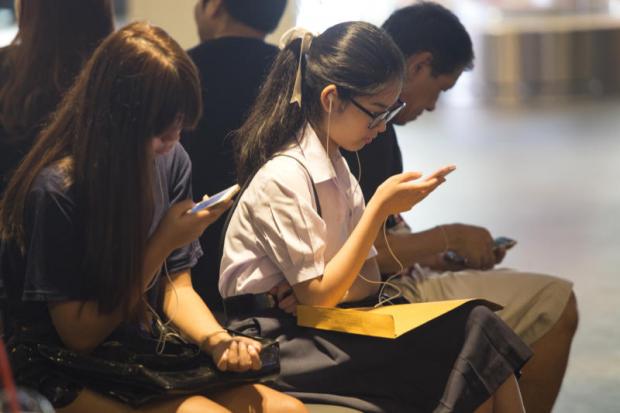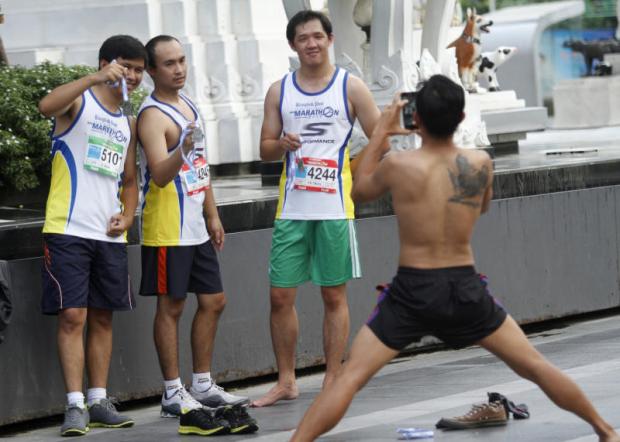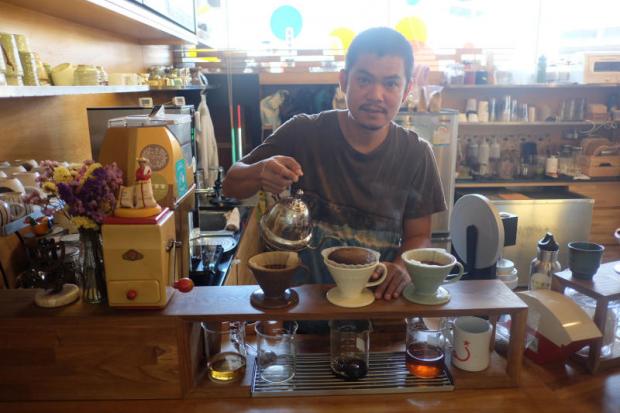
They wear deep red lipstick modelled after their idol, Taylor Swift. They worship the Apple and Visa brands, and enjoy music ranging from One Direction, DJ Calvin Harris and The 1975, as well as lesser-known performers with niche followings.
Many favour hipster culture and some want to be organic farmers. They like to sip coffee in retro cafes while reading Into the Wild or the writings of Thai author Seksan Prasertkul and asking each other questions about life.
They seek out exotic lifestyle choices, travel to out-of-the-way places and play extreme sports. Their idea of fame is participating in a reality television competition like The Voice Thailand and Thailand's Got Talent. But the quickest path to renown is sharing their lives and hobbies on social media, which can bring them fame overnight.
They are Thai millennials, or Gen Y, born between the early 1980s and early noughties.
In many ways, they are no different from their counterparts in the West. They are a diverse group, tech savvy, eager for promotion, individualistic and embrace globalisation via boundless online channels. They love being online, and according to the National Statistics Office, use the internet for eight hours a day on average.
But behind the cool profile pictures, many of them feel a growing disconnect with Thailand and its centuries of tradition and culture.
They feel under pressure from the older generations' interpretation of core Thai values and are shackled by chronic problems of ineffective education and political unrest.
CONTRASTING VALUES
"Thailand is like a big piece of paper painted brown. Our perspective is like drops of white colour splashed on this paper. But the white is not absorbed underneath. Neither colour mixes with the other."
High school student Chainwit Dhanasarnsombat, 15, uses this as an analogy for the transition from one generation to another. He and his peers are white. The older generations are brown, and how well the two colours mix depends on how well they understand each other.
Gen Y is already a significant presence, making up 32% of the Thai population of about 68 million and catching up with Gen X. Globally, the millennials are now the world's largest demographic, accounting for 38.8% of the population, according to the United Nations World Population Prospects, which noted developing nations tend to have a higher Gen Y population than developed ones.
Despite the numbers, Chainwit sometimes feels like he is in the minority.
"I think a lot of young people feel the same. People expect us to be 'good kids', which is subject to different interpretations," he said.
Being "good kids" has been mapped out by the junta's "12 core values of the Thai people" which was introduced after the 2014 coup. Students are required to recite it, either as part of their daily flag-raising ceremony or in class.
The values include: upholding the nation, religion and monarchy; respecting parents, guardians and teachers; concentrating on studies; and preserving Thai traditions and culture. These values have typified "good Thai behaviour" for decades.
But Chainwit and his friends have different values and goals such as being free to express themselves and make decisions, as well as being able to live an "extraordinary lifestyle".
Chainwit's idol is advertising film director Thanonchai "Tor" Sornsriwichai, whose production company Phenomena won the 2009 Cannes Lions International Advertising Festival Palme d'Or.
But his parents told him to stop watching the director's talks on YouTube, encouraging him instead to focus on studies and after-class tutoring.
Chainwit believes he is doing fine on his own. He reads the works of theoretical physicist and author Stephen Hawking, and uses Google to search for information beyond the basic mathematics and science taught in classes. He is bored with the old-style rote learning offered by his teachers, most of whom are aged over 40.
But he can't express this openly as criticising a teacher means disrespecting his elders, a "no-no" in Thai society. Many of his friends have expressed their frustration with the older generation on social media.
"Education without dialogue is making each student a replica of each other. I don't see how this can help my generation build a quality society," said Chainwit.
"It obstructs different generations from learning from each other, despite the fact classrooms should be the beginning point of an exchange of diverse ideas."
Thai millennials have grown up in the era of social media. About 80% of Gen Y who use the internet spend time on social media, the NSO reported.
This has led them to become more sceptical of teachers, soldiers and monks -- members of society who previously faced little criticism. Cliches like "a teacher is another mother", "the teacher is a role model of the nation" or "a solider is the fence of the nation" are deeply embedded in the Thai psyche.
But in recent years, those same institutions have been undermined by social media, with photos or video clips of their representatives misbehaving going viral. Those social media posts have included teachers hitting students and writing on their pants with coloured pens to discipline them, a young army conscript being beaten by a military officer and monks taking drugs, drinking and having sex.
The 2014 NSO survey showed 92.4% of Thai millennials agree that religious doctrine is still important in their lives, although it is a smaller percentage compared to previous generations.
DRIVING THE ECONOMY
Millennials are already the drivers of the national economy based on their spending habits.
With a low birth rate and long life expectancy, Thailand is becoming an "aged society" characterised by a high percentage of older people needing to be looked after by the younger demographic.

GET PHYSICAL: An adventure-friendly lifestyle. PHOTO: Pongpet Mekloy
By 2030, 25% of the population will be aged over 60, compared to the current 15%. Half of Thai workers (aged 15 to 59) will be millennials, according to the Office of the National Economics and Social Development Board. Research by the Siam Commercial Bank's Economic Intelligence Centre already identifies Gen Y as the largest consumer group.
Suriyadeo Tripathi, director of the National Institute for Child and Family Development at Mahidol University, said generational change was dependent on millennials being "quality" people.
This entailed better education levels, an understanding of social equality that decreases conflict and a duty to provide for the needs of others, including the coming generations of older people.
Education is the first step. But Dr Suriyadeo said this does not mean cut-throat competition to achieve the best exam results, which sometimes encourages selfishness and individualism. A competitive exam environment means students who don't perform as well may be unnecessarily "culled" from the tertiary education system.
Schoolboy Chainwit is already feeling the pressure to perform well in exams, spending after-class hours in a private tutorial school like many of his peers.
At tutorial schools, students are taught the curriculum for the next semester so they are in advance of their peers and can score higher in the Ordinary National Educational Test (O-Net) when they leave high school. This helps them get into top-ranked universities. Enrolling in top-ranked primary schools also requires nursery students to pass tests, so their parents often place them in tutorial schools at a very young age.
A Kasikorn Research Centre survey early last year found that tutorial schools are a growing business, earning an estimated eight billion baht in revenue for that year, an increase of 6.8% from 2014.
Last year, the Ministry of Education started a pilot project to "reduce classroom hours and >> >> increase learning hours" in some state-run schools. This, the ministry said, was to encourage outside-class learning via training and field trips.
The ministry reported last month that the students who participated in the project earned higher O-Net scores. But the project was criticised for contradicting the reality that O-Net still forces students to study at tutorial schools.
"A highly competitive education system that leaves kids no choice but to compete is a failure," said Dr Suriyadeo. "Indicators are a hike in stress rates, internet addiction and student violence."
On June 21, the National for Peace and Council issued an order under Section 44 to solve the problem of student brawling. Officials can detain them for up to six hours before summoning police, parents or school officials. Dr Suriyadeo said the extreme measures are another example of the failure of the system.
UNHEALTHY OUTLOOK
Studies also reveal that millennials and even younger people are less healthy than earlier generations.
According to a 2015 Public Health Ministry survey, the obesity rate of children in pre- primary classes had risen 36% compared to a study from five years earlier. For those aged six to 13 years, the increase was 15.5%. It concluded that unhealthy eating habits are the main factor, but critics have said that the long hours of cram schools have also reduced exercise time.
Another study from the Institute for Population and Social Research of Mahidol University in 2014 showed that Gen Y tends to exercise less than previous generations.
Dr Suriyadeo said the low birth rate and the emergence of more one-child families has resulted in parents mollycoddling their children.
This results in a dysfunctional family structure. For example, he said, parents often don't trust the public bus system so they drive or send their children to school in private vehicles.
Dr Suriyadeo said the younger generation in Thailand was growing up with fewer relationships and interaction with the outside world.
"Education rarely talks about the generation gap or asks questions as to what the next generation will be like. Understanding social change and individualism is not discussed in citizenship education," he said.
"If we already know that a generational transition is coming -- but the system does not give support for them to become literate and self-supporting people -- we will face a domino effect that leaves problems for the younger generation and society as a whole."
FLOWERS OR STONES
When student Parit "Penguin" Chiwarak, now 18, was in early primary school, he regularly saw media reports about the 2006 coup against Thaksin Shinawatra. When he was in Grade 5, he witnessed the political protests of the yellow shirts in 2008, followed by smoke drifting from the red shirt gathering in 2010. Once, while on his way home, he saw barricades made of barbed wire and car tyres.
In junior high school, he had to get off a bus and walk through a crowd of People's Democratic Reform Committee protesters to buy books near Democracy Monument.
"Growing up in long years of political unrest makes young people wither," he said. "The most important thing today is creativity that builds potential. But the atmosphere in Thailand can't encourage that in the young generation."
Now in Grade 12, and living in the post-coup era, Mr Parit campaigns for education rights and freedom of expression.
The draft constitution, which will be voted on at the Aug 7 referendum, proposes 12 years of free basic education from nursery school to Grade 9. The previous constitution guaranteed "at least" 12 years, which extended up to 15 with the completion of high school.
Facing protests, the NCPO used Section 44 to guarantee free education until Grade 12.
"Twenty years ago, we started the fight to get free basic education," said Mr Prait. "Over a decade ago, we achieved having it included among the rights of people in the 1997 constitution. Today we have to fight again for the same issue that was discussed 20 years ago."
Thai education is less progressive than other sectors and there are large quality gaps between regions, the NESDB reported last year.
Mr Parit is part of the Education for Liberation student group which has regularly arranged panels to discuss Thai education problems and has criticised the 12 core values of Thai people.
He has posted his picture and opinions on Facebook along with messages and open letters to Prime Minister Prayut Chan-o-cha and other senior figures. The responses are either "flowers or stones". Sometimes he is praised as a thinker of the young generation. Other times he is criticised for being "aggressive" or a "sick boy".
"I don't mean to attack anyone. I try to suggest solutions," he said. "The government seems focused on protecting state security rather than people's security and individualism, which is very important in this age."
Other groups of student activists such as Dao Din, Seree Kasetsart and Luk Chaoban have also faced pressure from the regime and official warnings for their campaigning.
On June 23, 13 activists from the New Democracy Movement and labour groups were arrested for distributing leaflets about the charter referendum in Samut Prakan and charged with violating the NCPO's ban on political gatherings of more than five people, as well as sedition.
Six of them sought bail while seven, all students, did not request bail in a show of civil disobedience. They were freed by court order on July 6.
Attachak Sattayanurak, an economics and political history professor at Chiang Mai University, said that after the May 1992 student protests against the Suchinda Kraprayoon government followed by the bloody military crackdown, student activism has passed down from generation to generation. Over the past 25 years, it has gradually disappeared, but it has returned with a new intensity after the 2014 coup.
"Conflict is making groups of young people aware and they express their opinions," he said. "They may not be many. But if authoritarian figures don't understand them and try to suppress them, more young people seeking a better future will emerge."
CREATIVE FUTURE
But another survey of college students, released by the Institute of Population and Social Research of Mahidol University in 2014, found they have a low level of participation in political activities. However, they take a great interest in environmental issues.
"It doesn't mean that all of them aren't interested in society," said Natthiti Ampriwan, 40, co-founder of Gallery Drip Coffee at the Bangkok Art and Cultural Centre. "They're bored with the mob mentality and are asking questions about the transparency of the system established by older people or politicians."
Mr Natthiti said many young people find their own creative solutions to issues such as the environment.
Born on the cusp of Gen X and Y, he is a role model for many millennials, combining his love of coffee and cycling with fresh environmental solutions. Mr Natthiti is part of the young coffee owner community which organises cycling trips to plant trees and buy coffee from local villagers at fair prices.
Another group of young marathon runners has organised an annual trail run in Ratchaburi province to help prevent and control fires. The runners' route encourages them to trammel undergrowth and weeds which have grown during the wet season.
Organic vegetable farms run by millennials are also springing up as part of the safe food movement and a desire for work-life balance.
Millennials such as Montri Boonyasat, 34, are taking old skills and reinventing them for a new market.
He worked as an editor in the magazine industry for 12 years, and witnessed a decline in print media. He then started to experiment with online media platforms while at the same time observing the growing trend of budget travel, low-cost airlines and "superstar" travellers who become famous for posting pictures and blogs of their travels online.
Mr Montri eventually began Travoiceler (Travel+Voice), a podcast broadcasting the voices of real people and their travel experiences. The participants ranged from ordinary people to airline pilots who had witnessed the aurora borealis from a cockpit.
All the stories are intended to inspire travellers to love the Earth.
"Today we can see 10,000 pictures of Machu Picchu on the internet," he said. "We can read [about travelling] on posts. But we're lacking voices that communicate happiness, experience and the excitement of real people. It's not apps dressing up travel pictures that transform people's values."
He is a part of young communities trying to match personal beliefs and values with a creative economy.
The NESDB suggests that a creative economy can rescue Thailand which has been trapped in labour-intensive industries and export dependence, and has set making Thailand the creative industrial hub of Asean as one of its goals.
But Mr Montri sees the development of the creative economy as being at a crossroads. Gen Y has opportunities from digital technologies that can produce successes that previous generations can only dream of -- such as becoming a millionaire within 10 years.
But technology itself is making them yearn for quick success while lacking the motivation and understanding to develop skills.
"The creative economy happens when everyone develops themselves in their own ways and share with others. In return, it will give back support to the whole society," Mr Montri said.

PLUGGED IN: Gen Y are hooked to their cellphones, considered vital to their everyday life. PHOTO: Narupon Hinshiranan

DIGITAL NOMADS: Gen Y people like to explore the world and post their discoveries on social media. PHOTO: KANJANA AYUWATTHANACHAI

THE RIGHT TO FIGHT: Parit 'Penguin' Chiwarak from Education for Liberation protests at Thammasat Rangsit Campus, demanding free education up for students until high school. PHOTO: CHAIRAT PATCHARATRIRAT

PUT TO THE TEST: Students leave the TU Star exam venue at Thammasat Rangsit Campus. The scores will be considered in their application for the university years that follow. PHOTO: Wichan Charoenkiatpakul

ON THE RUN: Young marathon runners. Still, Gen Y is reported to have lower health levels. PHOTO: Thanarak Khunton

Change is brewing: Natthiti Ampriwan, 40, co-founder of Gallery Drip Coffee at the BACC. PHOTO: SUPPLIED


